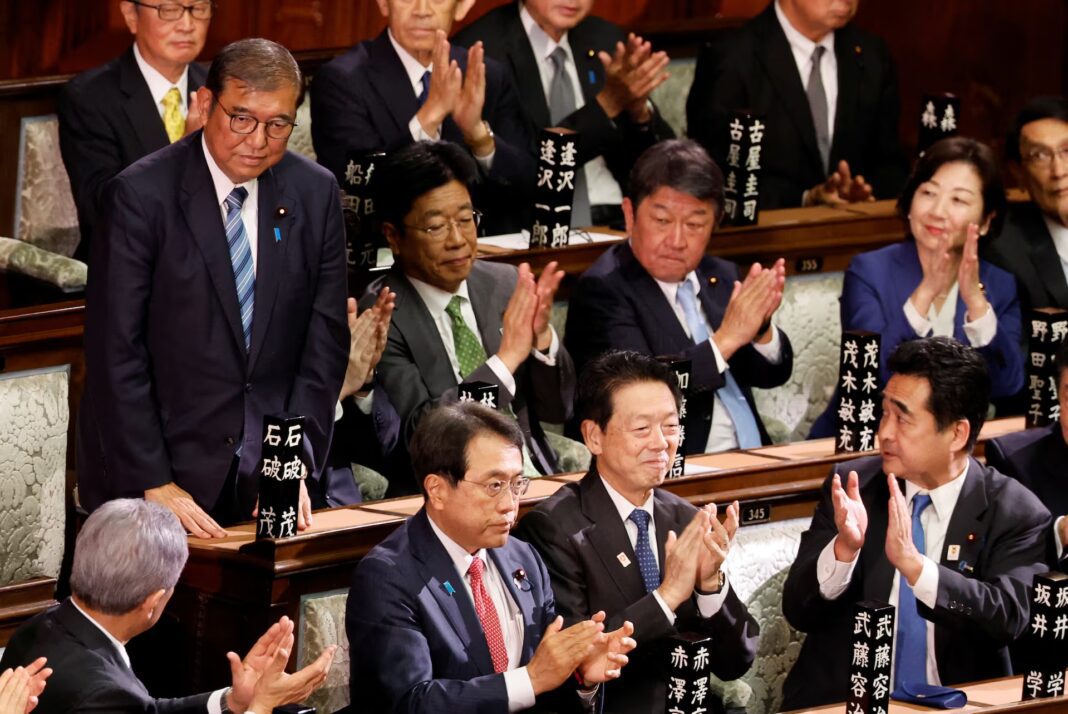Japan’s Prime Minister, Shigeru Ishiba, has won support to remain as leader following recent election setbacks. The decision was made in a parliamentary vote on Monday, even as his coalition faces new hurdles after losing its majority in the lower house. As Japan navigates shifting global alliances and pressing domestic concerns. Ishiba’s task of governing with a more delicate coalition, require careful strategy and cooperation to achieve his policy goals.
Struggle for Parliamentary Majority
In the snap election Ishiba called last month, his coalition, composed of the Liberal Democratic Party (LDP) and its partner Komeito, won the largest bloc of seats but lost its previously secure majority. Since then, Ishiba’s coalition has been in a weaker position, reliant on smaller opposition parties to pass legislation. Monday’s parliamentary vote further highlighted his government’s fragile standing, as it went to a runoff vote for the first time in three decades, underscoring divisions within the political landscape.
Ishiba ultimately garnered enough support to retain his position, with 221 votes in his favor. However, he fell short of a majority in the 465-seat lower house, indicating that his leadership will require careful coalition-building and negotiation. Next year, Japan will hold elections for the upper house, where the coalition’s slim majority could also be at risk if Ishiba fails to regain public trust.
Balancing Domestic Challenges: Rising Costs and Public Trust
Ishiba’s administration faces mounting domestic pressures, including addressing the cost of living crisis that has impacted many Japanese households. The rising cost of essentials has led to increasing demands from both voters and opposition parties for greater welfare spending. Ishiba is now preparing a supplementary budget to address these needs, which will be a key challenge in gaining wider support. To move forward, Ishiba will need the support of at least one opposition party, most likely the Democratic Party for the People (DPP).
International Pressure as the U.S. Returns to Trump’s “America First” Policies
As Ishiba navigates domestic issues, he also faces international challenges. The recent election of Donald Trump in the U.S. has added uncertainty to Japan’s foreign relations. Trump’s previous term as president brought waves of protectionist policies that affected U.S.-Japan trade relations, which were stabilized largely due to the close relationship between Trump and former Japanese Prime Minister Shinzo Abe. Ishiba now aims to rebuild similar rapport with Trump, hoping to maintain strong ties between the two nations and avoid potential trade conflicts.
Japan has relied heavily on its alliance with the U.S. for regional security, especially given tensions with neighboring China and North Korea. There is concern among Japanese officials that Trump’s return could bring renewed demands for Japan to increase its financial contribution to the U.S. military presence stationed in the country, a significant factor for Japan’s defense strategy.
Ishiba’s Upcoming Diplomatic Engagements
Ishiba’s calendar is filling up with critical international meetings that may shape Japan’s diplomatic and economic future. In mid-November, he is set to attend the Group of 20 (G20) summit in Brazil, where leaders from major economies will address pressing global issues. He also plans to stop in the U.S. to meet with President-elect Trump, hoping to establish a positive relationship. This stopover could be crucial for smoothing over potential policy disagreements and solidifying Japan’s role in future U.S.-led initiatives in the region.
Cabinet Reshuffle Amid Controversies
Following the confirmation of his leadership, Ishiba has appointed three new cabinet ministers to oversee transport, justice, and agriculture. Two of these ministers are replacing LDP members who lost their seats in the recent election, signaling a shift as Ishiba prepares to move forward with his plans. The cabinet appointments reflect Ishiba’s intent to bring fresh leadership to his team, focusing on ministers who align with his goals for economic stability, public welfare, and efficient government operations.
Navigating Tensions with China and North Korea
Japan continues to face regional tensions, particularly with China and North Korea. In recent years, China has expanded its influence in the Asia-Pacific region, while North Korea’s nuclear and missile programs have remained a concern for Japan’s national security. With Trump’s shift back to a more “America First” approach, Ishiba will have to balance Japan’s interests with the need for close security cooperation with the U.S., while also preparing for possible changes in regional security dynamics.
To strengthen Japan’s position, Ishiba may explore new regional partnerships and bolster existing ones. Given the U.S. administration’s focus on countering China, Japan might increase collaboration within frameworks such as the Quadrilateral Security Dialogue, which includes Japan, the U.S., Australia, and India, aimed at maintaining regional stability.
Securing Public Trust and Political Stability
A central challenge for Ishiba remains his ability to restore public trust in his government. The recent election loss has exposed concerns about the LDP’s handling of political scandals, including issues around unrecorded donations. With growing calls for transparency, Ishiba is under pressure to address these matters while also pushing forward on policies that resonate with Japanese citizens. His approach to these issues will play a key role in securing support as the coalition prepares for the upper house elections next year.
Looking Ahead: Strategic Challenges in a Changing World
As Japan’s leader, Ishiba faces a multifaceted set of challenges that require both diplomatic skill and a solid policy agenda. Balancing domestic demands for improved welfare and economic support with the complexities of international diplomacy will be a delicate task. His efforts to rebuild trust and establish cooperative relations with opposition parties will likely shape the success of his administration moving forward.
With Japan at a crossroads, Ishiba’s leadership may define the country’s future approach to domestic governance and global partnerships. His actions in the coming months will determine Japan’s ability to navigate a rapidly changing world, reinforcing its position on the global stage while addressing the immediate concerns of its people.

